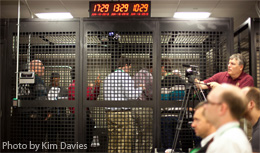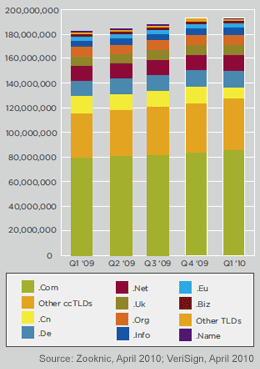

 ICANN video highlighting last week's historical DNSSEC key signing ceremony held in a high security data centre located in Culpeper, VA, outside of Washington, DC. "During the ceremony, participants were present within a secure facility and witnessed the preparations required to ensure that the so-called key-signing-key (KSK) was not only generated correctly, but that almost every aspect of the equipment, software and procedures associated with its generation were also verified to be correct and trustworthy." more
ICANN video highlighting last week's historical DNSSEC key signing ceremony held in a high security data centre located in Culpeper, VA, outside of Washington, DC. "During the ceremony, participants were present within a secure facility and witnessed the preparations required to ensure that the so-called key-signing-key (KSK) was not only generated correctly, but that almost every aspect of the equipment, software and procedures associated with its generation were also verified to be correct and trustworthy." more
More than 420,000 scam emails are sent every hour in the UK according to a report published by Card Protection Plan Limited (CPP). The study estimates that Britons were targeted by 3.7 billion 'phishing' emails in the last 12 months alone. And a quarter of people admit to falling victim to e-fraudsters, with the average victim losing over £285 each. more
J.D. Falk writes: Last week, MAAWG quietly published a new document titled "Overview of DNS Security - Port 53 Protection." [PDF] The paper discusses cache poisoning and other attacks on the local DNS, including likely effects of such a compromise and what access providers may be able to do to prevent it. more
Amy Smorodin writes: The Technology Policy Institute and the Centre for European Policy Studies are co-hosting "Internet Governance and ICANN: Emerging Policy Issues," scheduled for June 18th at CEPS in Brussels. The conference will feature discussion on issues stemming from ICANN's newly established operating structure under the Affirmation of Commitments. more
 The first quarter of 2010 closed with a base of over 193 million domain name registrations across all of the Top-Level Domain Names (TLDs), an increase of more than 1 million domain name registrations, or 0.6 percent, from the fourth quarter of 2009, according to the latest Domain Name Industry Brief published by VeriSign. "Compared to the first quarter of 2009, domain name registrations grew by 11 million, or 6 percent. The base of Country Code Top Level Domain Names (ccTLDs) dropped to 76.3 million domain names, a 2.9 percent decline quarter over quarter, but a 3.2 percent increase year over year." more
The first quarter of 2010 closed with a base of over 193 million domain name registrations across all of the Top-Level Domain Names (TLDs), an increase of more than 1 million domain name registrations, or 0.6 percent, from the fourth quarter of 2009, according to the latest Domain Name Industry Brief published by VeriSign. "Compared to the first quarter of 2009, domain name registrations grew by 11 million, or 6 percent. The base of Country Code Top Level Domain Names (ccTLDs) dropped to 76.3 million domain names, a 2.9 percent decline quarter over quarter, but a 3.2 percent increase year over year." more
According to a report released today, 69% of adult internet users, or roughly half of all U.S. adults (52%), have used the internet to watch or download video, with 18-29 year-olds leading the way. "We are seeing a surge in online video watching that is driven by a combination of broadband access, the increasing use of social networking sites, and the popularity of video-sharing sites," explains Kristen Purcell, Associate Director for Research at the Pew Research Center's Internet & American Life Project and author of the report. "To tap into these trends, untold numbers of websites now showcase online video as part of their content." more
In a report released today by The North American Electric Reliability Corporation (NERC) and the U.S. Department of Energy (DOE), cyber attacks are among the top high-impact risks -- "with potential to significantly affect the reliability of the North American bulk power system." Certain protections and mitigations are already in place to address these risks, and this study has been released to help public utility commissions, and the federal government to further prepare for these potential risks. more
 Symantec today announced that it has signed a definitive agreement to acquire VeriSign's identity and authentication business, which includes the Secure Sockets Layer (SSL) Certificate Services, the Public Key Infrastructure (PKI) Services, the VeriSign Trust Services and the VeriSign Identity Protection (VIP) Authentication Service. more
Symantec today announced that it has signed a definitive agreement to acquire VeriSign's identity and authentication business, which includes the Secure Sockets Layer (SSL) Certificate Services, the Public Key Infrastructure (PKI) Services, the VeriSign Trust Services and the VeriSign Identity Protection (VIP) Authentication Service. more
A recent study reveals a browser history detection method, largely dismissed as an issue with minimal impact, can in fact be used against a vast majority of Internet users with significant malicious potential. Researchers, Artur Janc and Lukasz Olejnik, analyzed real-world results obtained from 271,576 Internet users and have reported the results in a paper titled, "Feasibility and Real-World Implications of Web Browser History Detection". more
 Pioneering cryptographer Whitfield 'Whit' Diffie has joined the Internet Corporation for Assigned Names and Numbers (ICANN) as Vice President for Information Security and Cryptography. Diffie will provide advice on general security matters related to ICANN's mandate, and to ICANN in the design, development and implementation of security methods for ICANN-managed networks. He will oversee the continuous improvement and 'best practices' process for information security and cryptography. more
Pioneering cryptographer Whitfield 'Whit' Diffie has joined the Internet Corporation for Assigned Names and Numbers (ICANN) as Vice President for Information Security and Cryptography. Diffie will provide advice on general security matters related to ICANN's mandate, and to ICANN in the design, development and implementation of security methods for ICANN-managed networks. He will oversee the continuous improvement and 'best practices' process for information security and cryptography. more
 The first Internet domains using the Cyrillic script were launched on May 13 after Russia was officially assigned the .?? (.rf, for "Russian Federation") domain by the global Internet governing body. Representatives of the Internet Corporation for Assigned Names and Numbers (ICANN) handed Russia its Cyrillic domain administration certificate at an Internet forum that kicked off in Moscow. more
The first Internet domains using the Cyrillic script were launched on May 13 after Russia was officially assigned the .?? (.rf, for "Russian Federation") domain by the global Internet governing body. Representatives of the Internet Corporation for Assigned Names and Numbers (ICANN) handed Russia its Cyrillic domain administration certificate at an Internet forum that kicked off in Moscow. more
Brian Krebs reporting on the Krebs on Security blog: "The FBI's top anti-cyber crime official today said the agency is planning a law enforcement action against so-called 'money mules,' individuals willingly or unwittingly roped into helping organized computer crooks launder money stolen through online banking fraud." more
Millions of websites under Germany's top-level domains, .de, went offline on Wednesday due to a technical error according to various sources. While the exact cause of the outage is still unknown, the problem is reported to have originated from DENIC, the central registry for the .de top-level domain. more
A paper released today by ICANN provides a chronology of events related to the containment of the Conficker worm. The report, "Conficker Summary and Review," is authored by ICANN's Dave Piscitello, Senior Security Technologist on behalf of the organization's security team. more
The Internet Society - New York Chapter (ISOC-NY) has for some years been following the .nyc and ICANN process on behalf of the NYC community and will, on May 8 2010, host a symposium "dot nyc - How are we doing?" at NYU. At 1pm NYC Council Member Gale Brewer will deliver keynote remarks, then Vendor Eric Brunner-Williams of CORE Internet Council of Registrars will reveal details of their proposal to the City, and Antony Van Couvering of Minds + Machines earlier comments to the City Council concerning their proposal will be shown in video. ...there will be a discussion "What's it for?" about possible applications - civic, community, commercial, and "outside the box" - for a local top level domain. more
Sponsored byWhoisXML API

Sponsored byRadix

Sponsored byVerisign

Sponsored byVerisign

Sponsored byDNIB.com

Sponsored byIPv4.Global

Sponsored byCSC
